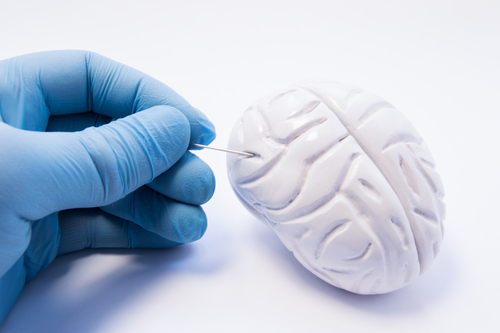The U.S. Food and Drug Administration (FDA) has accepted a request by Acadia Pharmaceuticals‘ that Nuplazid (pimavanserin) be approved for a new indication: the treatment of delusions and hallucinations associated with dementia-related psychosis. The company’s supplemental new drug application, which was submitted in June, was granted standard review status. The FDA’s decision is expected by April…
About Alzheimer’s Disease
Walking into a room and forgetting why you went into the room is normal. Walking into a room and forgetting what room you are in is not normal. Alzheimer’s disease is the most common form of dementia and affects one in ten people over the age of 65. Unfortunately, the exact cause of Alzheimer’s disease is not fully understood however leading scientific experts in the field attribute the illness to the irreversible and progressive generalized degeneration of the brain. Alzheimer’s disease goes well beyond the forgetfulness that may accompany aging, and typically first signs include difficulty remembering current information or performing new tasks. Ongoing hallmark symptoms include impaired memory function, difficulty performing everyday tasks, and neurobehavioral abnormalities. Currently, there is no known cure for Alzheimer’s disease, and multi-disciplinary treatment focuses on symptom management and limiting progression.
Conditions
Alzheimer’s News
Global Phase 3 Trial Will Test BAN2401 in Early-stage Asymptomatic Alzheimer’s
BAN2401, an experimental treatment for Alzheimer’s disease (AD), will be tested in the new global AHEAD 3-45 clinical trial, its developers have announced. The Phase 3 study — to be conducted in the U.S., Canada, Japan, Australia, Singapore, and Europe — will test the therapy in people who are in the early stage of the…
Alzheimer’s Foundation Expands Toll-free Helpline to Support Patients, Caregivers
The Alzheimer’s Foundation of America (AFA) is expanding the availability of its National Toll-Free Helpline — adding weekend hours as well as chat and message features in dozens of languages — to provide greater support to patients and family members. The resource’s hours now are 9 a.m. to 9 p.m. EST on weekdays, and 9…
Amylyx Completes Enrollment in PEGASUS Trial of AMX0035 for Alzheimer’s
Amylyx Pharmaceuticals announced it has completed enrollment for the Phase 2 clinical trial of AMX0035 for treating Alzheimer’s disease. The placebo-controlled trial, PEGASUS (NCT03533257), will evaluate the compound’s safety and tolerability among patients with late mild cognitive impairment or early dementia due to Alzheimer’s disease. Other study endpoints (goals) include the compound’s effects on Alzheimer’s biomarkers (methods…
Investigational Agitation Treatment AXS-05 Named FDA Breakthrough Therapy
The U.S. Food and Drug Administration (FDA) has granted breakthrough therapy designation to Axsome Therapeutics‘ AXS-05, an investigational oral therapy for the treatment of agitation in people with Alzheimer’s disease. This designation is intended to accelerate the development and review of potential therapies for serious diseases. It is awarded upon clinical evidence of substantial improvement…
Advanced Imaging Captures Protein Clumps in Neurons at Early Alzheimer Stages
Scientists used a new imaging technique to assess the structure of amyloid-beta aggregates — known culprits in Alzheimer’s development — that are present inside nerve cells at early stages of the disease, a study reports. These findings, from a mouse model, may be important to understanding the different stages of Alzheimer’s progression. The study, “Super‐Resolution Infrared Imaging of…
Amyloid Clumps Formed on Space Station Affected by Microgravity
Experiments on the International Space Station showed gravity affects the formation of amyloids, the pathological tangles of proteins found in the brains of those with Alzheimer’s disease. Both the speed by which they formed and the structure they took in microgravity differed from amyloids formed through similar means in an Earth-bound lab, the scientists reported,…
Anavex 2-73 Trial for Early Alzheimer’s Expanded to Canada, UK
Anavex Life Sciences will expand its Phase 2b/3 clinical trial testing the efficacy and safety of Anavex 2-73 (blarcamesine) for the treatment of early Alzheimer’s disease into Canada and the United Kingdom (U.K.) following the go-ahead from Health Canada and the U.K.’s Medicines and Healthcare products Regulatory Agency (MHRA). The clinical trial, dubbed Anavex 2-73-AD-004…
Neurotrope Launches Long-term Trial of Bryostatin-1
Neurotrope has announced the launch of a Phase 2 clinical trial to investigate the long-term use of bryostatin-1 for moderate and moderately severe Alzheimer’s disease. The company expects to dose the first patient later this year. “We are very excited to advance Bryostatin-1 to its next phase of development,” Daniel Alkon, MD, president and chief…
‘The Longest Day’ Global Fundraiser Set for June 20
“The Longest Day” is the summer solstice — the day with the most light — which falls this year on June 20. It’s also the day each year that people all over world battle “the darkness of Alzheimer’s” through fundraising for the Alzheimer’s Association (AA). All proceeds raised in the annual daylong fundraiser go to…
Mouth Bacteria Can Infect Brain Cells, Research Finds, Supporting Alzheimer’s Link
A type of mouth bacteria involved in gum disease is able to infect human brain cells, new research shows. The infection results in cellular changes that are similar to what is seen in Alzheimer’s, supporting a link between the bacteria and the neurodegenerative disease. The findings were presented at the Advances in Alzheimer’s and Parkinson’s…
FDA Approves Tauvid as First Tau Protein Tracer Tool for Alzheimer’s Diagnosis
The U.S. Food and Drug Administration (FDA) has approved Tauvid (flortaucipir F18) as an imaging radiotracer agent — a radioactive diagnostic tool — to efficiently detect clumps of tau protein in the brain, one of the hallmarks of Alzheimer’s disease. “Alzheimer’s disease is a devastating condition that affects millions of Americans. This approval will provide health…













